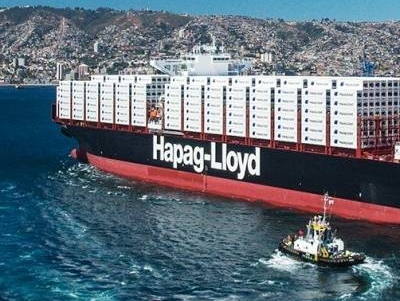
Hapag-Lloyd adds another large container ship to its fleet
September 28, 2017: Liner shipping company Hapag-Lloyd will add another large container ship to its fleet. The ‘Al Jmeliyah’ will be handed over to Hapag-Lloyd tomorrow at the shipyard of Hyundai Samho Heavy Industries (HSHI) in South Korea. With a capacity of 15,000 TEU, this ship is classed as an ultra-large container vessel (ULCV). The […]

September 28, 2017: Liner shipping company Hapag-Lloyd will add another large container ship to its fleet. The ‘Al Jmeliyah’ will be handed over to Hapag-Lloyd tomorrow at the shipyard of Hyundai Samho Heavy Industries (HSHI) in South Korea.
With a capacity of 15,000 TEU, this ship is classed as an ultra-large container vessel (ULCV). The ‘Al Jmeliyah’ is the last in a series of 17 newbuilds contracted to HSHI by UASC in the summer of 2013. The series comprised eleven 15,000-TEU and six 19,900-TEU ships, the first of which was delivered in 2015. Following the merger with Hapag-Lloyd at the end of May this year, these units are now all part of the Hapag-Lloyd fleet, which currently consists of 219 ships.
The ‘Al Jmeliyah’ will begin operating this weekend on the FE4 service of THE Alliance between Asia and Northern Europe, just like its predecessor, the ‘Afif’, which was delivered in July. These new ships are setting the highest standards in environmental protection and have particularly low consumption and emission values thanks to innovative technologies on board. For example, they have a sophisticated waste heat recovery system and a connection for shore-based power, and they are certified as LNG-ready. The “Al Jmeliyah” is 368 metres long, 51 metres wide and has a maximum load rating of 153,148 tonnes. Its name means “the beautiful one” in Arabic.
“With this newbuild, our fleet – one of the youngest and most modern in the industry with an average age of just 7.1 years – is now complete,” said Anthony Firmin, chief operating officer of Hapag-Lloyd, referring to the delivery.
“We have no plans to order any more newbuilds in the foreseeable future.”

